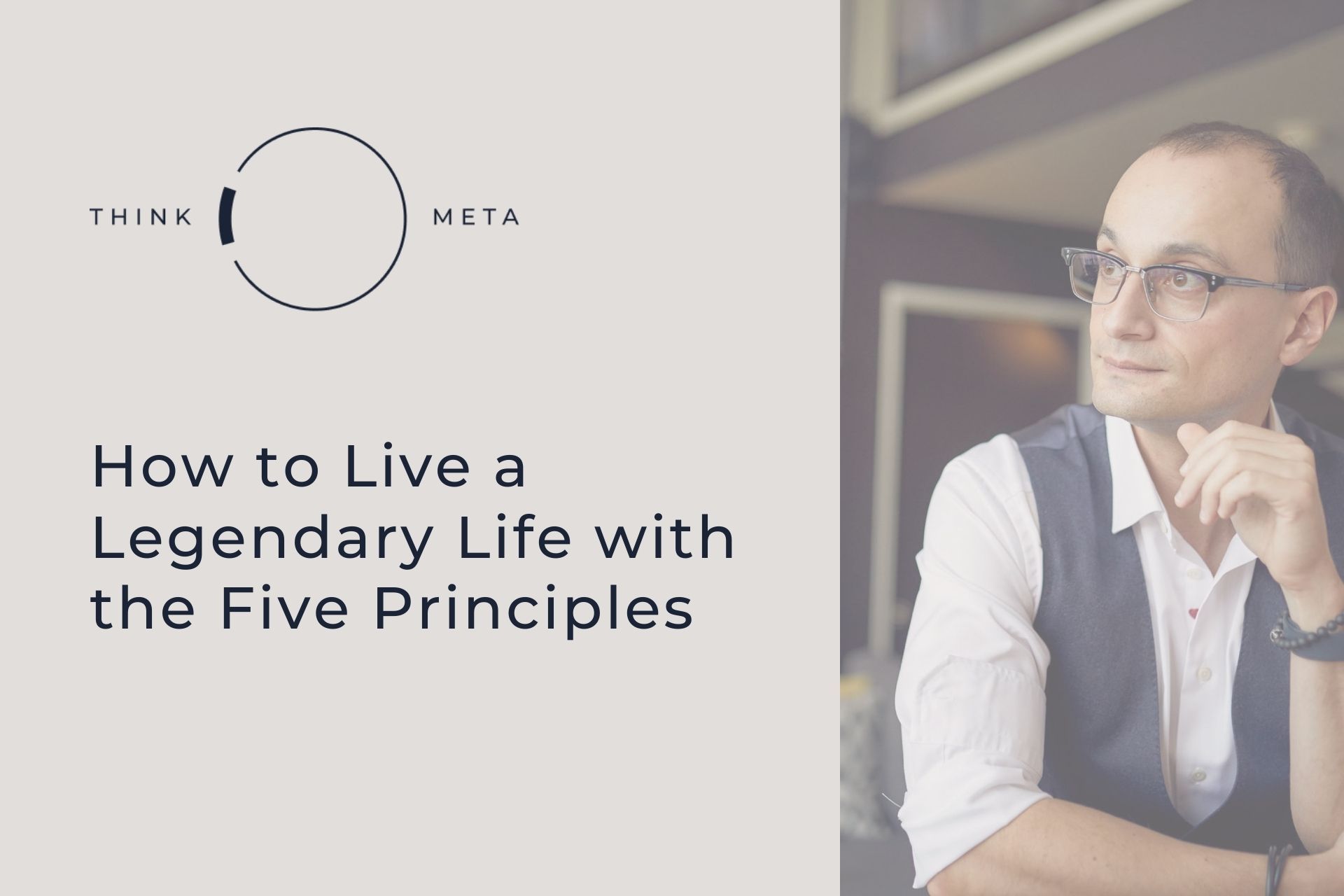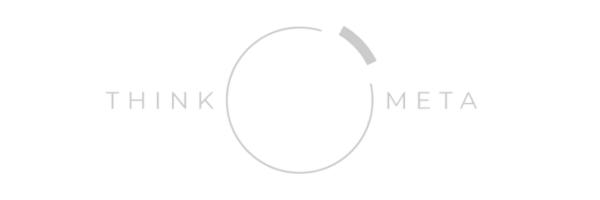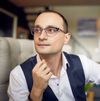How to Live a Legendary Life

How do you change the life of an ordinary person and turn it into a legendary one?
My obsession with this question has enabled me to create a company that inspires admiration and trust from my clients. My name is Misha Saidov, and I am the founder of the life performance coaching company Think Meta and IMCP (Institute of Metacognitive Programming). I am also a graduate of the Beck Institute for Cognitive Behavior Therapy in Philadelphia.
Understanding Mysticism and Its Role in Knowledge
Now, I don't know why you're here or whether you want to live in a completely different way. But if you accept my invitation to spend some time together, after a few months you won't recognize yourself. You will know more about how the human body works and gain insight into the thought process, optimizing your decision-making. You will also begin to understand how the world works and will find happiness. This is what I mean by a legendary life: greater satisfaction, abundance, and happiness.
My lessons sit at the intersections of neurochemistry, psychology, biomedicine, philosophy, and mysticism. But before I continue, let me explain what mysticism is and why I include it in my lessons. Mystics are people who find solutions to questions that science does not yet have answers to. Thanks to their keen attention and knowledge, mystics can see connections between phenomena that are not obvious to others. Many scientists are mystics. They predict what will be "discovered" hundreds of years from now.
I'll give you an example.
In 1818, a boy named Ignaz Semmelweiz was born in Hungary. Ignaz had a very special destiny: in 50 years, he would be known as the savior of mothers. At the age of 26, in 1844, he became a physician, and two years later, he began to specialize in obstetrics. At that time, every tenth woman in the hospital where Ignaz worked died in childbirth. The mothers thought that this hospital was cursed and preferred to give birth in the street - anything to avoid being inside the building. Even in street births, maternal mortality was half what it was in hospital wards. Within three years, Ignaz saved thousands of mothers. In his care, no woman would die again.
The solution Ignaz discovered seemed mystical at the time. He noticed that the mortality rate was much higher in the department where medical students who had just practiced on cadavers examined the women. At that time, no one knew about the existence of bacteria. Ignaz would have had to imagine that tiny particles, invisible to the naked eye, remained in the hands of the students. His solution: he made everyone in his department wash their hands. Mortality dropped manifold.
To see what others do not yet see is to be a mystic. History will later reveal whether you were a mystic or an illusionist, deceiving even yourself.
I'm willing to take the risk. We will begin this lesson with a mystical statement. You have probably heard the phrase "thoughts are material," - meaning that you get what you think about. But this is not entirely true. A fearful passenger will not cause the plane she's in to fall from the sky. Most people don't constantly think about diseases; however, many people do get sick.
How, then, does everything work?
The Power of Perception and How It Shapes Our Reality
I'll start with a few simple ideas that were discovered long ago: everything we see around us needs a name.
For example, from my window, I see an object that I describe to myself as a house. If I brought a person who lived 200 thousand years ago here with a time machine, he wouldn't understand that this is a house. No story exists in his head about houses the way it exists in my head. I know that houses can be lived in, that they come in different sizes and ages, and that they usually have a roof, windows, and so on. Thus, each of the objects that we perceive with our eyes, ears, by touch, by smell, or by extrasensory perception have a meaning in our heads.
Over time, instead of objects and phenomena, we begin to see only our own meanings. Such is the work of the brain. It's easier for it to retrieve previously processed information from memory than to analyze objects anew each time.
Any intentional thought process takes a lot of energy. Evolution has sharpened our brains to conserve energy by defining what we see at the expense of internal images. The neocortex, the wrinkled napkin that wraps our brains, works like a big predictive or image-building machine and describes everything we see in our consciousness. Later we'll analyze in greater detail how consciousness works. For now, it's enough for you to understand that consciousness is like a recording device that observes what happens to us.
The brain uses images and comments to describe reality to our consciousness. These are our thoughts - phrases or pictures connected through a cause-and-effect relationship. This is how our history is created.
For example, if someone smiles at you, you conclude that they are friendly. The most important stories in our lives are formed in early childhood. They tell us how it should and shouldn't be and what we like and don't like. Essentially, these stories are instructions - instructions for you, instructions for others, and instructions to the world.
Every time we encounter something that doesn't match our instructions, emotions arise. If reality exceeds our expectations, we experience positive emotions. If the reality is worse than expected - negative.
For example, your hands are full, but the person in front of you doesn't hold the door for you. According to your internal instructions, he should have. Because he didn't behave according to your expectations, you feel annoyed.
Evolution has played another interesting trick on us. Our brain remembers which groups of words correspond to certain emotions and, over time, removes the need to analyze reality altogether. We don't need to see a lemon in front of us to salivate. And it's enough for us to just remember a sad moment to cry.
The emotions we experience serve as a kind of compass for decision-making.
Thoughts that feel good make us keep doing what we were doing. Thoughts that feel bad make us stop.
We frequently react impulsively to external circumstances, submitting to the instructions in our head and obeying our emotions. From my lessons, you will learn that these instructions are usually wrong and that circumstances must be managed with clear intention and one hundred percent attention.
But first things first.
As I mentioned earlier, the goal of my lessons is to completely reflash your understanding of reality and improve the quality of your life a hundred times over.
The Five Principles for Extraordinary Achievement
So let's start with the fundamental principles that will guide us on our way.
These principles are used at Think Meta and help ordinary people do extraordinary things.
There are five principles.
- See through.
- Hear behind the words.
- Go to the end.
- Be a product of your product.
- Achieve the impossible.
All the lessons that I teach you will be about one of these principles.
Let's talk a little about each of them.
Seeing through gives a deep understanding of the theory of evolution and genetics.
The personal growth industry is misleading, convincing us that something is lacking in us, and we urgently need to acquire it. We're taught that we should want to be different. Today I came across an article suggesting that people who don't set goals won't achieve anything or become successful. I disagree. Success in life does not depend on goal setting. Some people are more predisposed to planning and goal-setting than others. Seeing through is a skill that helps determine people's predispositions based on their biology. The self-development industry should teach us to see our strengths and grow to our maximum potential, not tempt us with illusions that it will never work out.
Let me give you a metaphor for why this is important. Whales don't fully sleep because half of the whale's brain must be awake to control its breathing; it's not biologically created to enter a state of deep sleep. In the same way, if I force a person to do something for which he is not biologically created, then I will only bring suffering into his life. In later lessons, I will tell you more about how to see through.
The next principle is to hear behind the words.
Most psychologists agree with the so-called biopsychosocial theory of human development. This theory claims that our behavior is the result of heredity and the influence of society.
My contention is that behavior is either the result of heredity (i.e., genes) or instructions in the head. Instructions are thoughts about how to behave and what to avoid in order to avoid dangerous consequences. To hear behind the words is to understand how you think and what instructions you rely on.
Imagine that your life is a chess game. The rules of the game are your genes - you can't change them. You can move the pieces on the board in millions of variations - these are your choices, and they are the results of the thoughts in your head. In other words, you can't change the rules, but you can change your mind.
To turn you into Elon Musk, it's not enough to give you his genes (although his genes promise achievements, constant partner changes, depression, and a brilliant mind). To turn you into Elon, you need to download all of his thought paradigms. The ability to hear behind the words allows you to understand that what a person believes in and what they rely on guides their actions.
The third principle is to go to the end.
Here we'll talk about emotional regulation and how to embody any emotion, dissolve the ego and move through life without fear.
The fourth principle is about actions and algorithms. To be a product of your product means to ensure that the external matches the internal. This is an interesting paradox because everything around you is a reflection of who you are. In life, you get not what you want but how you think. The quality of your thinking is reflected in everything. Soon I'll give you an algorithm to optimize your thinking so that you know what to do as soon as you're ready.
And the last principle is to achieve the impossible. While all previous principles are based on the latest achievements of science and are 100% evidence-based, this principle is philosophical and mystical. It will appeal to those who intend to change their lives and make themselves worthy of leadership.
In the next episode, we'll talk in more detail about the first principle - the ability to see through.

